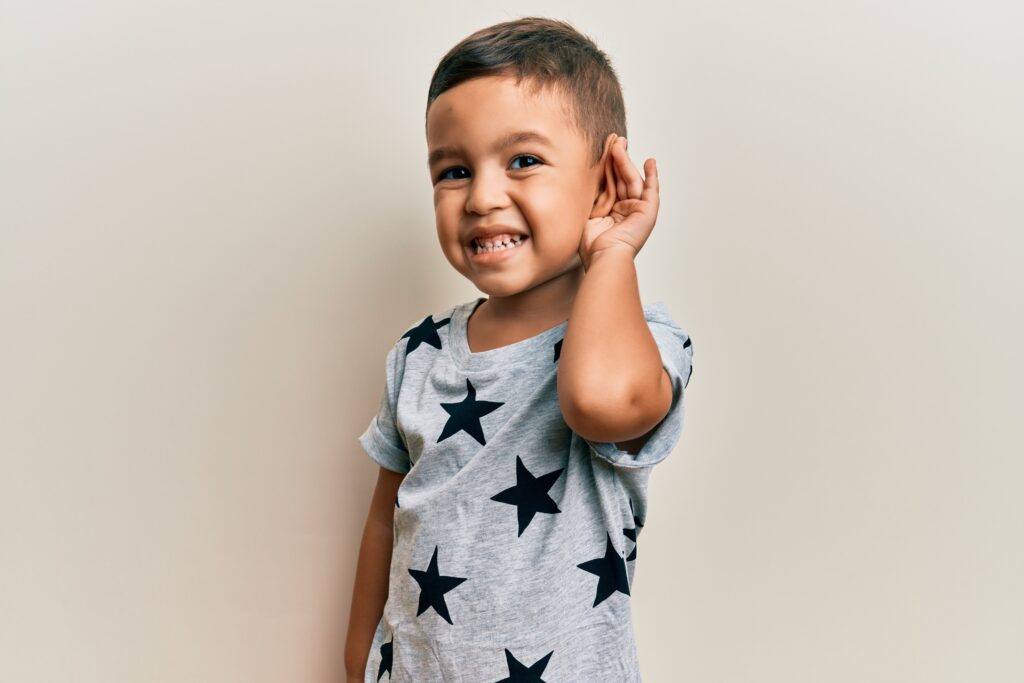Even though hearing loss is most common in older adults, there is a risk of children experiencing hearing problems in the earliest stages of life. In fact, an estimated 2 out of every 3 children in the United States have a detectable level of hearing loss – either in one ear or both ears.

Sometimes, hearing loss is genetic. But 90% of children born with hearing loss have hearing parents. As a parent, it’s important to watch for the signs of hearing problems with your children. Remember that early intervention is the best solution, especially since hearing loss can affect a child’s speech, language, and cognitive development.
The good news is that plenty of interventions, accommodations, and technology can be used to ensure your hearing-impaired child is thriving in their learning and growth. The more you know about hearing treatments, the better prepared you will be to support your child in every way possible.
If it is discovered that your child is experiencing hearing loss, then the audiologist will perform testing to determine the underlying cause. There are different reasons why hearing loss can occur in childhood, and some of these factors can be treated. Even if your child’s hearing loss is untreatable, there are often options to amplify their hearing and help them function in their daily activities.
As a parent, you might notice small behaviors and nuances in your child’s personality that could be an indication of hearing loss. Keep in mind that the symptoms vary depending on your child’s age and the severity of their hearing loss. Some of the most common signs and symptoms of hearing loss in children include:
In the earliest stages of life, an infant or toddler doesn’t have the communication ability to tell you that something is wrong with their ears. But there are common signs that they might have hearing issues, which can also impact the child’s development:
At this point, many children have annual hearing testing at school. But these basic tests don’t show the whole picture, which is why it’s a good idea to schedule a hearing test with an audiologist if you suspect that your child is experiencing hearing loss. You might notice signs such as:
Regardless of the severity of your child’s symptoms, it’s always best to schedule a hearing test if you suspect that they are experiencing mild, moderate, or severe hearing loss. Hearing tests are simple and painless, so it’s best to err on the side of testing even if you aren’t sure about the symptoms.
It’s a regular practice for newborns to have a hearing screening. In fact, many states have mandates that require a hearing screening shortly after birth. The goal is to detect genetic hearing loss as soon as possible, especially because these hearing issues could affect the child’s growth and development. Timely intervention will set the child up for the best success possible as they are growing.
Additionally, children should have regular hearing checkups. These hearing tests should happen throughout childhood, and especially if the child has any risk factors. If you are unsure about the optimal timing for hearing tests, talk to the child’s pediatrician or contact an experienced audiologist for personalized recommendations.
It can feel devastating when your child has been diagnosed with hearing loss. But rest assured knowing there is hope! Many advances in the industry and modern solutions have been developed that can accommodate the child to live their best life possible, without letting hearing loss slow them down.
If you are concerned about your child’s hearing, then the best thing you can do is schedule an appointment with our team. We offer a supportive environment where you can learn ways to support your child at home, in the classroom, and in social settings.
Contact us at Fairfax Hearing Center to schedule a consultation and see how we can help.